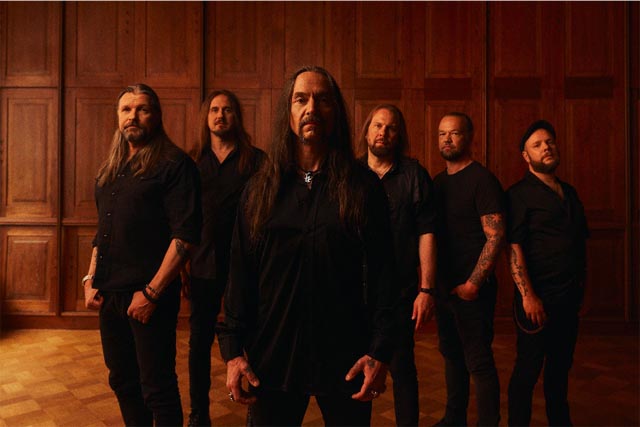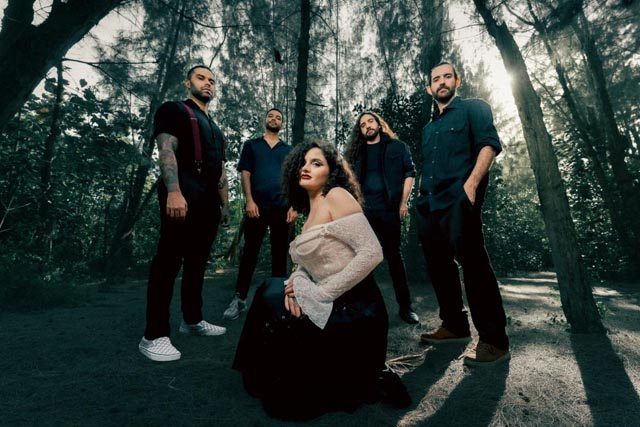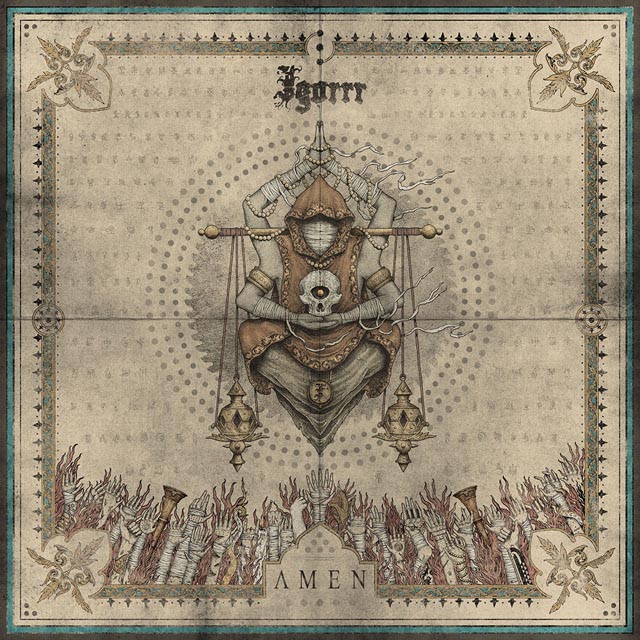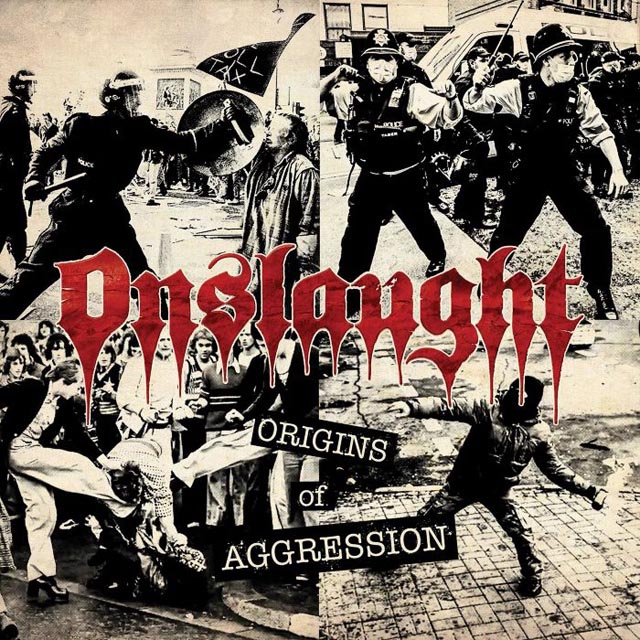 It’s a long way from the mean streets of Flint, MI to the 28th floor of the office building that houses Roadrunner Records in midtown Manhattan. That’s not lost on the members of King 810, whose debut album for the label, Memoirs of a Murderer, will be released this coming Tuesday (19). We sat with the band in a studio, where they earnestly answered questions about their rise from the streets to getting signed, the reaction they provoke from fans and critics alike, and the incident in which many first heard about them, when singer David Gunn and bassist Eugene Gill were arrested on charges of assault earlier this year just before they were set to play the Download Festival.
It’s a long way from the mean streets of Flint, MI to the 28th floor of the office building that houses Roadrunner Records in midtown Manhattan. That’s not lost on the members of King 810, whose debut album for the label, Memoirs of a Murderer, will be released this coming Tuesday (19). We sat with the band in a studio, where they earnestly answered questions about their rise from the streets to getting signed, the reaction they provoke from fans and critics alike, and the incident in which many first heard about them, when singer David Gunn and bassist Eugene Gill were arrested on charges of assault earlier this year just before they were set to play the Download Festival.
I’ll start off just by asking about the fight charges that almost delayed the start of touring around this record. Did you know that it was come back and might haunt you?
David Gunn: Nah. We didn’t really know. It happens all the time so we didn’t think it was really a big deal. And then we got to the airport and we got arrested, we still really didn’t know what it was for. I was thinking it could have been for a bunch of things. Then on the way back, we learned what it was for. So yea, it was surprising that it came up because more serious things have happened and went unnoticed. So it was kind of petty and we didn’t think anything of it, especially since it was last year. No one really gave it a second thought.
Were you nervous about the possibility of missing the Mayhem fest?
David: We wanted to make Mayhem and we definitely didn’t want to miss it, but I don’t think we were nervous. I wasn’t nervous at all sitting in there or anything like that. I thought it was petty. I didn’t take it seriously and I knew it wouldn’t be how it is now, so just having done that a few times, we knew that we were going to be out in time to still make the fest you know what I mean? So maybe not nervous but other things. Like we definitely wanted to make it and we wanted to be there, but we were confident that we could get it all sorted out in the week beforehand.
Do you feel like you’re being held to a higher standard now? If you were challenged now, would you go about it a different way?
David: No. Probably should elaborate on it, but no. I mean since we’re sitting here and doing an interview in this room in Manhattan yea I’ll say yea, but in reality, nah.
Eugene Gill: I mean I feel like there’s already so much I can say seeing my case is still pending; I can’t really talk to you much about it.
David: I’ll say it. No! Fuck no!
Do you think now there are going to be people that will challenge you based on your reputation?
David: Yea, that happens all the time. That’s probably what this was. We had this reputation at home before this record or this music or all this stuff. We didn’t become these people when everyone else noticed us you know what I mean? This is who we really are so at home this thing happens all the time. This is, like I said, one of the more petty or non-serious issues. So we’re use to this. It’s been going on for a long time.
It seems like there’s been a little bit of a backlash about you, not just the image of the band but how quickly you’ve come up. How do you address it? Do you just welcome people talking shit?
David: Yea we don’t really address it because we don’t really care.
Eugene: We know everyone is going to be saying whatever they want online so we don’t even fuck with it.
David: Online is not a real place anyway so any one talking on there really doesn’t mean anything whether they say anything good or bad. I don’t really care about those types of things and we’ve been doing this for long enough and we’re from Flint. It takes a little bit more than some guy saying something on the internet to get a rise out of us you know what I mean?
Eugene: No I don’t really care about any of that.
Andrew Beal (guitars): The shit-talking online is the brightest spot of the day.
David: Yea if someone tells us this shit, we would be laughing. We deal with real problems. We don’t care about what somebody hiding behind a fuckking keyboard says.
How would you respond to people that might say you’re glorifying violence by having people on stage with guns for your show?
David: I would respond by saying it’s a misinterpretation basically. I don’t understand how someone could make the connection and say that we’re glorifying anything by doing something like that. It was an artistic statement. It’s a show. When we play we want to kind of visually represent what the songs are sonically for people to see. That’s what “Killem All” looks like and that’s why the video looks that way and that’s what it looks like at home and that’s commonplace at home and that’s where we come from. We’re not ashamed of it or we’re trying to hide it or we’re not trying to sweep it under the rug. It kind of made itself obvious when we released the “Killem All” video. That was kind of what everyone was trying to do because they’re all real things, real clips; that really happened. For some reason people saw that as offensive which is kind of telling about the state of things and how they are. So I don’t see how showing you how things are, where we come from is glorifying violence. It’s a variable in the equation that’s present and that’s how we are and who we are and we wouldn’t change it for anything. If we did, and we started pulling things that people didn’t agree with out of our character, we would just be like everyone else ,you know what I mean?
Did you view the band as way to get out of Flint or will you always stay there?
David: Yea, we could have left a long time ago. We were born and raised there and you know when you’re a kid, that’s where you live and that’s where your parents have you, but we’re all adults and we’ve been adults for a while. We could have left a long time ago; we’re not trying to use this as some vehicle to grow up and get away from it. It’s in the name and it’s basically synonymous with the band so we wouldn’t just take off on the city. We’re going to stay. I don’t really have any plans on leaving. I don’t think anyone does. We could have left a while ago if leaving was what we wanted to do.
So no New York, Toronto, or LA?
Whole band: NO!
What is the heavy music scene like in Flint? Are there a lot of Bands?
David: No, there’s no scene. Regardless of what some people might say. It’s not a thriving metropolitan city and there’s no thriving music scene. There’s no thriving anything really. There’s not a business district and there’s not venues and community things and activities that where it would harness those kinds of things I guess. There’s not a scene; bands aren’t coming out of Flint. It’s not coincidental that we’re the first band to come out of Flint since like Grand Funk Railroad or something like that. It’s not a common breeding ground for bands.
What got you into the music initially considering there was no scene?
Eugene: There was more of a scene when we were growing up, still not a big scene, but it was more of a scene than it is now.
David: There was a place when we were young, a venue that had a little small club. That was kind of how we met, a couple of us. When I was a kid, I always wrote ten years before I even started playing music when I was a little kid. When I started meeting people that played music, that was kind of how we met and through that we just kept meeting the next guy and the next guy and the next guy and we just picked up who was good. We kept that and that’s us four.
It seems like there’s a bit of a nu-metal revival happening, bands influenced by Korn, rap-rock, and other music from around the turn of the century. It seems like that kind of music is coming back. Would you consider yourself a part of it?
David: No. I don’t want to be a part of any of that.
Eugene: We don’t set out to be anything.
David: Undoubtedly you have influences consciously and subconsciously that come out and they make themselves present. When we’re trying to write songs, we just write the song in a way that the song is going to be. The song kind of runs itself. It would lead to things that what you just get out of the way and make the song what it wants to be. All things aside like nu metal or hip-hop, we of course listen to all music and definitely at a subconscious level is influential, even at a conscious level. We don’t set out to spear head any campaign or lead some sort of movement or anything. We’re just making songs that we want to make regardless. I think if you heard the record you can hear that we’re not really kind of embracing any genre or any type of one type of thing. It’s King, but it’s all different kind of dynamics and sides to the group.
Some of the songs on the album go against what’s been put out so far: acoustic guitar, a little bit softer. Was there a question to whether they fit with King?
David: No. We don’t have any kind of fear about fitting with our own. We created King and we are King, so anything we do is King. Anything else would assume that we take into account the outside perspective. But we don’t take that in consideration when we’re making songs. That’s the last thing I think people that create things should do is take into account what is safe or what we can get away with or what’s King or not King. King is us four; whatever we do is King so those songs didn’t come in any kind of way like as an afterthought or as an anomaly or anything like that. We didn’t make the meat of the record be heavy and then start adding our own little experimental fancies. They’re just as big a part of the group as the heavy stuff is. It’s just a multi-faceted thing.
You’re obviously staying as close to your roots as possible. Was there any question when Roadrunner decided to sign you or did you consider going with a smaller label and building up?
David: No. We never were those guys that wanted to be cool or be credible or be anything. We’re just going to be ourselves and exist in our own thing regardless of who thinks what of it or the stigma or the connotation that goes along with a label or whether it’s a major label or not. We’re not those guys. We want our songs to be in as many people’s hands, in as many people’s ears as possible. No, it’s not like we were searching for the biggest thing but it’s not something we shy away from or scared to go at or anything like that. This thing is for everyone so that was a plus; it was a major so far.
And we were never going to go for a major label or look for a label till we needed a label to do for us what we couldn’t do for ourselves. We’ve been doing this for years and we’ve financed it ourselves. We put our own money in, our own work into it. With that being said, we wouldn’t have went with an independent because we could be independent independently. We don’t need tour support or to press a few thousand discs or to have our discs in local shops and things like that. We want to have someone that’s going to be able to do for us what we couldn’t do for ourselves. It was necessary to be at Roadrunner and to be at a major that’s going to go to bat for you and put your disc everywhere across the world. These are all necessary things for what we want. These other bands act like they’d do anything to get like a 5 thousand dollar record deal. We were putting more than that out of pocket on records. It’s like if you want it that bad you’d do it yourselves.
Eugene: Yea it was never one of those. We don’t have that kind of attitude to where it’s one of those situations.
How far back do those songs on the albums go?
David: Maybe 5 years. They started coming in at 2009. Like right after I got shot the first time was when we started making a new kind of sound.
What were the earlier stuff like?
David: When you were an amateur, you’d wear your influences on your sleeve and try things more liberally and you don’t have a sense of identity or a sense of artistry, a sense of self; you haven’t found yourself yet. So you’re basically mirroring or mimicking who you admire the most. But after you do that for so many years, a crazy third party perspective lets you step outside yourself and analyze things for what they really are and how everyone else might perceive them. You kind of find your sense of self and your identity as your own artist. There’s a reason why we’ve been a band for seven years and we have one record and one LP. It’s because regardless of how we felt about our songs and how our shit was, we knew that it wasn’t competitive. Not that it’s a competition, but it wasn’t up to par and wasn’t up to standard and it wasn’t what we didn’t feel like we could stand next to people we really admired and hold a candle to them. So we didn’t put anything out. We thought we had to get better and we’ve been playing music for over a decade. I’ve been writing for almost two decades and it’s kind of like that perspective that you gain once you find your own sense of artistry and your sense of self and who you are. That’s invaluable. Before all of this, we were influenced by different scenes and different things and it was faster and more poetic and metaphoric and almost not as cohesive. It wasn’t digestible and it was kind of getting lost on people. So it wasn’t as prominent and well defined and characters as our own.
Can you name some of the influences or would you rather not?
David: The influences from older stuff?
Yes the older stuff.
David: What it was for me was the influences were never any different. I’ve listened to the same everything since always, but it’s your skill and how you interpret influence and how it actually comes out the other side. Almost like you have this lens in front of you and when you’re an amateur musician, things are influencing you and molding you in a certain way. Well once you cross this threshold after so long, you aren’t affected by outside elements. The influences stay the same. It was just our skill and how well we executed our interpretation of the outside world, whether it be music or books or film or just life. It was becoming your own artist. To me it’s how good are you at interpreting what’s going on around you when it comes out the other side through your filter. Through some person from Flint, for friends that are from Flint that have been through this and that and this is who we are. Not so defined artist don’t have that filter. It’s not a well-defined filter. It’s almost like a fishing net rather than a fine cheese cloth. Shit just comes through the bitch as a whole. I hate to use the cheesy analogy but you got the fishing net where shit is just flying through the holes and that’s what comes out the other side. Dam near the same as when it went through in the first place. That’s kind of the only way I can put into words that it was more of how we interpreted things and how skilled we were at conveying ideas or representing them musically and sonically in the language of music is the difference between good artists and shit artists.
How has Mayhem fest been for you guys so far?
Band: Good!
David: Not like you would think if you’ve read online articles right? You would think there would be somebody, someone wired there to fight us at every show and somebody heckling, somebody throwing stuff. The crowds have been great, everyone has been well receptive. Even the kids, so many kids would come up to me and said “I’ve never even heard of you guys until today and now I’m a life-long fan.”
Eugene: The real people in real life at the shows, they’ve all been supportive and proactive and they’ve been receptive to what we’re doing. There have been no bad experiences. The response has been really great.
Are there any bands that you’ve particularly bonded with?
Eugene: Body Count!
David: Yea the dudes from Body Count have been really cool with us.
Eugene: They’re the coolest dudes on the tour.
David: I agree. I think we kind of just share the common bound of speaking on real s**t. It’s like they kind of having the similar message; it’s a no non-sense mentality. I hate to say the cliché line but real recognize real. But everyone else has been cool to. It’s not like we’re going to go out and have some beef with others band or something. Or give them a bunch of f**king drama to talk about for the next week.






